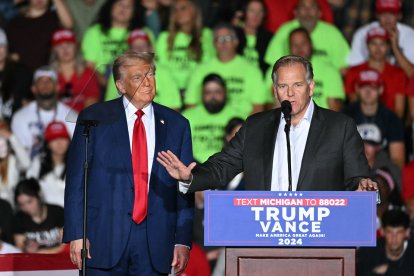Republican Mike Rogers announced a new Senate bid in Michigan: "Let's get to work"
The former congressman was already a Senate candidate in 2024 and was defeated by Democrat Elissa Slotkin. It was the closest race of the past election cycle, as the difference between the two was 0.3 percentage points.

Rogers with Trump at Saginaw Valley College/Jim Watson.
Mike Rogers announced another run for the Senate in Michigan. After losing in 2024 to Elissa Slotkin, the Republican ran again for 2026. Under the slogan "hands on," the former chairman of the House Intelligence Committee presented himself as the best option to dye red the seat currently held by Gary Peters, who already announced he would not run for re-election. As an open seat in a competitive state, this race is expected to be one of the most expensive and evenly matched of the midterm elections.
The 61-year-old Republican made his intentions public through a video posted on his X account, in which he reviewed his political career and promised to work to lower government spending, make energy cheaper, and help pass the president's agenda down Capitol Hill.
"President Trump needs strong allies in the Senate to help him carry out the mandate of the American people," Rogers expressed on his X account, where he presented himself as a conservative capable of pulling independent votes.
">President Trump needs strong allies in the Senate to help him deliver on the mandate given by the American people.
— Mike Rogers (@MikeRogersForMI) April 14, 2025
That means bringing manufacturing jobs back to Michigan, protecting seniors’ social security, lowering the costs of gas, groceries & prescription drugs, and… pic.twitter.com/MBNn5gcZ4t
Indeed, he was already a Senate candidate in 2024, when he was defeated by Democrat Slotkin. It was the closest race of the past election cycle, given that the difference between the two was 0.3 percentage points, the same as saying 19,006 votes out of more than 5.5 million cast.
The final difference between the two was the number of people who voted for Trump for president but chose not to vote for Rogers for Senate. While Slotkin received 25,000 fewer votes than Kamala Harris, Rogers received 125,000 fewer than the Republican incumbent.
"That means bringing manufacturing jobs back to Michigan, protecting social security for seniors, reducing the costs of gasoline, food and prescription drugs, and preparing our children for success by improving the quality of their education. Michigan, let's get to work," he added.
The former congressman's candidacy already garnered important endorsements within the Senate, such as those of Tim Scott and John Thune, Republican majority leader in the upper chamber. He also received the support of Newt Gingrich, former speaker of the House of Representatives.
The GOP's chances in the Senate for 2026.
In Georgia, Senator Jon Ossoff could face a tough opponent in Brian Kemp, the state's current governor. Should he enter the race, he is expected to face no Republican primary opponents.
According to the WPA Intelligence/Club for Growth poll conducted in mid-January, Kemp is the only Republican ahead of Ossoff. Indeed, while the governor would defeat him by six percentage points, Mike Collins, Buddy Carter, Marjorie Taylor Greene, Brad Raffensperger, and Rich McCormick rank behind the Democratic incumbent.
In New Hampshire, Senator Jeanne Shaheen (D-NH) announced that she will not seek a fourth term in 2026. Among Democrats interested in running, Congressmen Maggie Goodlander and Chris Pappas stand out. The latter has already announced his candidacy.
On the Republican side, and despite being the strongest candidate according to polls, former governor Chris Sununu dropped out of the race. Former Senator Scott Brown, who was ambassador to New Zealand during the first Trump administration, is expected to enter the race.
RECOMMENDATION























